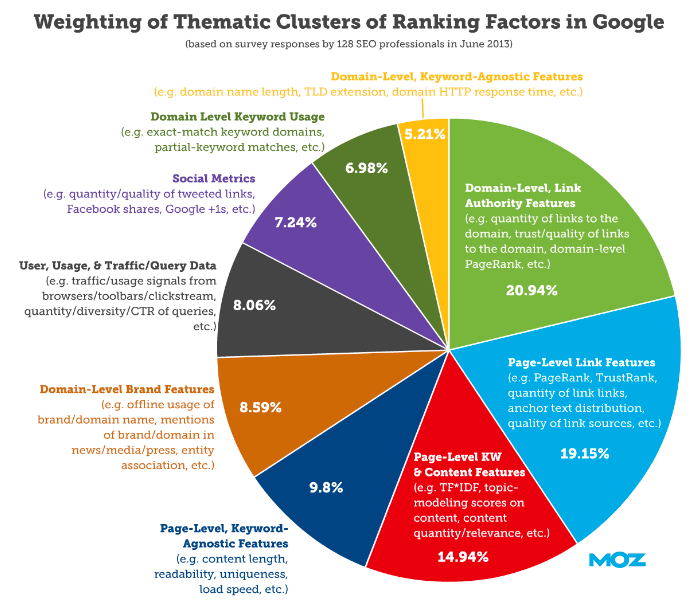Search Engine Optimisation (or SEO) for short is, “the process of affecting the visibility of a website or a web page in a search engine’s unpaid results”. In this article on SEO basics, we look at the fundamentals of this process and why you need to be devoting time to this yourself if you have a website yourself.
Why Should Anyone Care About SEO?
As I’ve already said, SEO is the process of taking steps to optimise your website so that it appears nearer the top of search results.
Why would you want to do this?
Well if your website is poorly-optimised then Google and other search engines will struggle to find it and add it to their index.
Usually the aim of any website owner is to have their website found for one reason or another. Of course there may be many different reasons for this.
Some webmasters will want their website found because they make money from advertising or affiliate links, and the more people visiting their site, the more money they make.
Or sometimes the webmasters are physical business owners who want their website to pop up at the top of search results when Googling a particular product or service.
For instance, a plumber in Manchester won’t make any money from someone visiting their site per se, but they may gain a lead/prospect after the searcher found their telephone number and rang up to enquire about their services.
Likewise, if you sell products online via an ecommerce website, you want to get your website near the top of the rankings, otherwise you won’t have a business at all. No clicks mean no visitors, and no visitors means no sales.
Of course there are some websites that just serve up information, such as Wikipedia. These types of websites, still want to appear top of the search results as a sign of the authority of the website.
The NHS will want to make sure important factual health information on a specific disease appears at the very top of search engine results instead of some spammy pseudoscience websites selling some “miracle cure”.
In essence, although the reasons may differ, all website owners want to be at the top (or as close as possible) of search results.
What’s more, if you are monetising your website and you manage to get your website to the top of the first page for any of your target search terms, trust me, you are going to be much better off financially than you were before you invested your time and energy into SEO!
SEO Basics: The Three Fundamentals
So now we’ve agreed you want to get your website to rank for one reason or another let’s take a look at what it takes to get your website seen by the wider world.
SEO can seem very daunting to the uninitiated, but it doesn’t have to be that way. Once you begin to learn the basics, the rest quickly falls into place. Before we get into the three key elements, it is worth taking a second to understand how search engines work.
This video from Matt Cutts, the former head of Google Search explains it better than I can:
So now you know how Google evaluates your search query and pulls the best possible results from its index (in under 0.5 seconds!), we can take a lot at the three key areas of SEO and what they entail.
On-Page SEO
This is probably where most people begin their SEO journey. There no point creating hundreds and thousands of links to your website if your website has poorly-optimised posts or pages.
The best way of describing on-page SEO is by making tweaks to your websites posts and pages that make it easier for Google’s spider bots to crawl and make sense of them.
This means thinking about things like:
- How many times do you mention the keyword you want to rank for on your page?
- Have you included it in your headings and subheadings?
- Have you have written a catchy blurb (meta-description) for your search engine result page (SERP)?
- Making sure you’ve done your keyword research properly so that you are targeting an achievable search term.
- Have you marked up your page with Schema?
- Making sure your alt text on images matches your keywords
- Have you included several internal links to other important pages on your website?
- Have you included topic-relevant external links in your content?
This is by no means an exhaustive list and the jargon in here can be a little intimidating but fear not, I will be revisiting all of these sub-topics in their own respective posts at a later date.
Once you think you’ve nailed all of the optimisation of your own web pages, it’s time to think about what you can do to improve your site’s ranking by influencing factors that aren’t under your control.
Off-Page SEO
This is where you probably notice the results of your SEO efforts the most. By far still one of the most important ranking factors are links to your website. You can write the most unique, amazing and optimised content on the planet, but if there aren’t any links to the content then it is highly unlikely that you will ever see any meaningful traffic.
There also several other off-page factors that you can influence to increase your position in the search results, such as utilising social media.
Off-Page Optimisation consists of items such as:
- Acquiring backlinks to your domain (Home Page)
- Acquiring backlinks to specific pages
- Using social media to send signals to Google’s algorithm
- Guest posting on other websites
- Contributing to forums relating to your topic
- Writing on your topic for question and answer sites such as Quora or contributor sites like Medium and Buzzfeed.
- Adding your website to local and national directories
- Taking ownership of your Google properties (e.g. Google Maps listings)
Again this list is by no means complete, it just gives you an idea of what you will need to do to optimise outside of your website.

This leaves us with just one general area left to cover.
Technical SEO
This is the stuff that can sometimes really through people off or demoralise them completely because of the complex jargon, but once you learn a few things you quickly realise that it is not all that hard to do.
Whilst this work is technical in nature, there are guides to every aspect of this side of SEO plastered across the internet and they are not hard to read, learn and implement.
When approaching the technical aspect of SEO, you will be addressing things like:
- Improving page speed
- 301 and 307 redirects
- 404 error codes and how to fix them
- Canonical URLs
- Noindex and nofollow tags
- txt files
- Sitemaps
- Learning Google Search Console
- Google fetch and render
This is just a fraction of what to expect when tackling technical SEO, but all you have to do is learn and implement one aspect per week and you will soon be up to speed and witnessing the results in your ranking data.
Wrap Up
So there you have it, a very basic introduction to the SEO basics and its three core elements. Over the next few months and years I’ll be consistently delving into much more detail about how to get your website to rank using SEO.
I’ll also periodically give you behind the scenes access to this website’s data and let you know what I’m doing on a daily basis to try and improve the search position of this website.
Looking forward to seeing you in the next post.
